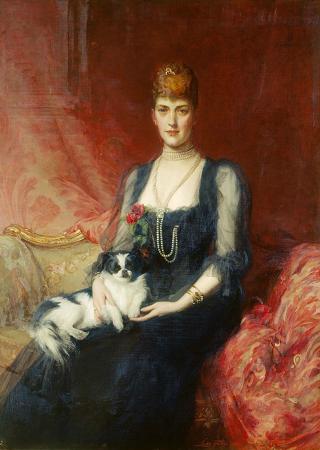Alexandra of Denmark (1844 - 1925). Alexandra of Denmark was Queen consort of the United Kingdom and the British Dominions and Empress consort of India as the wife of King Edward VII. Alexandra's family had been relatively obscure until 1852, when her father, Prince Christian of Schleswig-Holstein-Sonderburg-Glücksburg, was chosen with the consent of the major European powers to succeed his distant cousin, Frederick VII of Denmark. At the age of sixteen, she was chosen as the future wife of Albert Edward, Prince of Wales, the heir apparent of Queen Victoria. They married eighteen months later in 1863, the same year her father became King Christian IX of Denmark and her brother was appointed as King George I of Greece. She was Princess of Wales from 1863 to 1901, the longest anyone has ever held that title, and became generally popular; her style of dress and bearing were copied by fashion-conscious women. Largely excluded from wielding any political power, she unsuccessfully attempted to sway the opinion of British ministers and her husband's family to favour Greek and Danish interests. Her public duties were restricted to uncontroversial involvement in charitable work. On the death of Queen Victoria in 1901, Albert Edward became king-emperor as Edward VII, with Alexandra as queen-empress. She held the status until Edward's death in 1910. She greatly distrusted her nephew Wilhelm II, German Emperor, and supported her son George V during the First World War, in which Britain and its allies fought Germany. Princess Alexandra Caroline Marie Charlotte Louise Julia, or Alix, as her immediate family knew her, was born at the Yellow Palace, an 18th-century town house at 18 Amaliegade, right next to the Amalienborg Palace complex in Copenhagen. Her father was Prince Christian of Schleswig-Holstein-Sonderburg-Glücksburg and her mother was Princess Louise of Hesse-Kassel. Although she was of royal blood, her family lived a comparatively normal life. They did not possess great wealth; her father's income from an army commission was about E 800 per year and their house was a rent-free grace and favour property. Occasionally, Hans Christian Andersen was invited to call and tell the children stories before bedtime. In 1848, King Christian VIII of Denmark died and his only son Frederick ascended the throne. Frederick was childless, had been through two unsuccessful marriages, and was assumed to be infertile. A succession crisis arose as Frederick ruled in both Denmark and Schleswig-Holstein, and the succession rules of each territory differed. In Holstein, the Salic law prevented inheritance through the female line, whereas no such restrictions applied in Denmark. Holstein, being predominantly German, proclaimed independence and called in the aid of Prussia. In 1852, the major European powers called a conference in London to discuss the Danish succession. An uneasy peace was agreed, which included the provision that Prince Christian of Schleswig-Holstein-Sonderburg-Glücksburg would be Frederick's heir in all his dominions and the prior claims of others were surrendered. Prince Christian was given the title Prince of Denmark and his family moved into a new official residence, Bernstorff Palace. Although the family's status had risen, there was little or no increase in their income and they did not participate in court life at Copenhagen as they refused to meet Frederick's third wife and former mistress, Louise Rasmussen, because she had an illegitimate child by a previous lover. Alexandra shared a draughty attic bedroom with her sister, Dagmar, made her own clothes and waited at table along with her sisters. Alexandra and Dagmar were given swimming lessons by the Swedish pioneer of women's swimming, Nancy Edberg. At Bernstorff, Alexandra grew into a young woman; she was taught English by the English chaplain at Copenhagen and was confirmed in Christiansborg Palace. She was devout throughout her life, and followed High Church practice. Queen Victoria and her husband, Prince Albert, were already concerned with finding a bride for their son and heir, Albert Edward, the Prince of Wales. They enlisted the aid of their daughter, Crown Princess Victoria of Prussia, in seeking a suitable candidate. Alexandra was not their first choice, since the Danes were at loggerheads with the Prussians over the Schleswig-Holstein Question and most of the British royal family's relations were German. Eventually, after rejecting other possibilities, they settled on her as the only one to be chosen. On 24 September 1861, Crown Princess Victoria introduced her brother Albert Edward to Alexandra at Speyer.
more...





